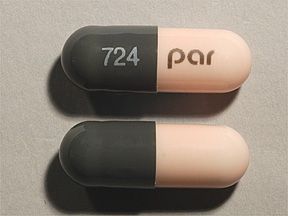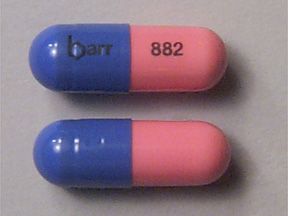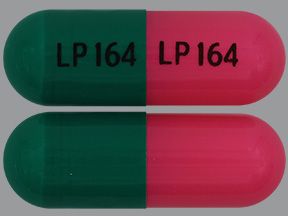Highlights for hydroxyurea
- Hydroxyurea oral capsule is available as brand-name drugs. Brand names: Hydrea and Droxia.
- Hydroxyurea comes in two forms: a capsule and a tablet. You take both forms by mouth.
- Hydroxyurea oral capsule is used to treat myeloid leukemia and head and neck cancers. It’s also used to treat sickle cell disease.
FDA warnings
- This drug has black box warnings. These are the most serious warnings from the Food and Drug Administration (FDA). A black box warning alerts doctors and patients about drug effects that may be dangerous.
- Suppressed immune system warning: The Droxia form of the capsule can reduce your body’s ability to make certain blood cells. This can decrease your ability to fight off infection. This drug can also reduce your body’s ability to make normal blood clots or use oxygen. This is called bone marrow suppression. Your doctor will monitor you closely for side effects from bone marrow suppression. These side effects include fever, infection, bruising, or bleeding.
- Cancer risk warning: The Droxia form of the capsule can cause leukemia and skin cancer. However, this is rare. If you take this drug, use sunscreen and other protection from the sun and follow up with your doctor for regular skin checks.
Other warnings
- Pregnancy warning: If a pregnant woman takes hydroxyurea, it can harm the pregnancy. Women of childbearing age who take this drug should use effective birth control during treatment and for at least 6 months after stopping this drug. Men who use this drug should use effective birth control during treatment and for at least 1 year after stopping this drug.
- Blood vessel damage warning: Hydroxyurea may cause damage to your blood vessels. This has mostly occurred in people with cancer who were also taking interferon.
- Radiation rash warning: If you have received radiation therapy in the past and experienced a rash from it, taking Hydrea or the generic form of Hydrea may make the rash come back.
- Respiratory (breathing) problems warning: Hydroxyurea may cause a life threatening lung problem known as interstitial lung disease. Call your doctor right away if you have any symptoms of lung problems. These may include shortness of breath, a new or worsening cough, other trouble breathing, or fever.
Hydroxyurea is a prescription drug. It comes in two forms: a capsule and a tablet. You take both forms by mouth.
Hydroxyurea oral capsule is available as the brand-name drugs Hydrea and Droxia. Hydrea is also available as a generic drug. Droxia is not. Generic drugs usually cost less than the brand-name version. In some cases, they may not be available in every strength or form as the brand-name drug.
Hydroxyurea may be used as part of a combination therapy. This means you may need to take it with other medications.
Why it’s used
Hydroxyurea is used to treat myeloid leukemia and head and neck cancers. It prevents cancer cells from growing. It’s also used to treat sickle cell disease.
How it works
Hydroxyurea belongs to a class of drugs called antimetabolites. A class of drugs is a group of medications that work in a similar way. These drugs are often used to treat similar conditions.
In people with cancer, hydroxyurea acts as a substitute for some parts that the cancer cells need to grow. Cancer cells take in hydroxyurea, which stops the cancer cell from growing. Cancer cells grow more rapidly than normal cells, so they are more affected by the drug.
In people with sickle cell disease, this drug changes the shape of red blood cells. This makes it less likely for sickle cell crises to occur.
Hydroxyurea oral capsule can cause dizziness and drowsiness during the first few hours after you take it. These side effects are more likely to happen when you start treatment or when your doctor increases your dosage.
This drug can also cause other side effects.
More common side effects
The more common side effects of hydroxyurea can include:
- stomach pain
- constipation
- diarrhea
- nausea
- vomiting
- loss of appetite
If these effects are mild, they may go away within a few days or a couple of weeks. If they’re more severe or don’t go away, talk to your doctor or pharmacist.
Serious side effects
Call your doctor right away if you have serious side effects. Call 911 if your symptoms feel life threatening or if you think you’re having a medical emergency. Serious side effects and their symptoms can include the following:
- Leukemia. Symptoms can include:
- more frequent infections than you normally have
- Skin cancer. Symptoms can include:
- changes to skin color and texture
- new moles or bumps on your skin
- Blood vessel damage. Symptoms can include:
- developing open sores on your arms or legs
- Lung disease. Symptoms can include:
- fever
- shortness of breath
- cough
Disclaimer: Our goal is to provide you with the most relevant and current information. However, because drugs affect each person differently, we cannot guarantee that this information includes all possible side effects. This information is not a substitute for medical advice. Always discuss possible side effects with a healthcare provider who knows your medical history.
Hydroxyurea oral capsule can interact with other medications, vitamins, or herbs you may be taking. An interaction is when a substance changes the way a drug works. This can be harmful or prevent the drug from working well.
To help avoid interactions, your doctor should manage all of your medications carefully. Be sure to tell your doctor about all medications, vitamins, or herbs you’re taking. To find out how this drug might interact with something else you’re taking, talk to your doctor or pharmacist.
Examples of drugs that can cause interactions with hydroxyurea are listed below.
HIV drugs
Taking didanosine or stavudine with hydroxyurea increases your risk of damage to your pancreas and liver. You also have increased risk of nerve pain.
Disclaimer: Our goal is to provide you with the most relevant and current information. However, because drugs interact differently in each person, we cannot guarantee that this information includes all possible interactions. This information is not a substitute for medical advice. Always speak with your healthcare provider about possible interactions with all prescription drugs, vitamins, herbs and supplements, and over-the-counter drugs that you are taking.
This drug comes with several warnings.
Allergy warning
Hydroxyurea can cause a severe allergic reaction. Symptoms can include:
- trouble breathing
- swelling of your throat or tongue
If you develop these symptoms, call 911 or go to the nearest emergency room.
Don’t take this drug again if you’ve ever had an allergic reaction to it. Taking it again could be fatal (cause death).
Warnings for other groups
For pregnant women: Hydroxyurea can harm a fetus. This is based on findings from animal studies, and on our knowledge of how the drug works.
Women of childbearing age who take this drug should use effective birth control during treatment and for at least 6 months after stopping this drug. Men who use this drug should use effective birth control during treatment and for at least 1 year after stopping the drug.
If you’re a woman and you become pregnant while taking this drug, contact your doctor immediately.
For women who are breastfeeding: Hydroxyurea may pass into breast milk and cause side effects in a child who is breastfed. You should stop breastfeeding when you are taking hydroxyurea. Talk to your doctor if you breastfeed your child.
For seniors: If you are older than 65 years, your body may be more sensitive to this drug. Your doctor may have you take a lowered dosage.
For children: This medication has not been studied in children. It should not be used in children younger than 18 years.
All possible dosages and drug forms may not be included here. Your dosage, drug form, and how often you take the drug will depend on:
- your age
- the condition being treated
- how severe your condition is
- other medical conditions you have
- how you react to the first dose
Dosage for myeloid leukemia
Generic: Hydroxyurea
- Form: oral capsule
- Strength: 500 mg
Brand: Hydrea
- Form: oral capsule
- Strength: 500 mg
Adult dosage (ages 18 years and older)
- Hydrea and generic hydroxyurea: Your doctor will decide your dosage based on various factors. These factors include your actual or ideal body weight, whichever is less.
- Droxia: This form is not used for this condition.
Child dosage (ages 0–17 years)
It has not been confirmed that hydroxyurea is safe and effective for use in children younger than 18 years.
Special dosage considerations
For people with kidney disease: The typical initial dosage of Hydrea and generic hydroxyurea is reduced by 50 percent in people with kidney disease.
Dosage for head and neck cancer
Generic: Hydroxyurea
- Form: oral capsule
- Strength: 500 mg
Brand: Hydrea
- Form: oral capsule
- Strength: 500 mg
Adult dosage (ages 18 years and older)
- Hydrea and generic hydroxyurea: Your doctor will decide your dosage based on various factors. These factors include your actual or ideal body weight, whichever is less.
- Droxia: This form is not used for this condition.
Child dosage (ages 0–17 years)
It has not been confirmed that hydroxyurea is safe and effective for use in children younger than 18 years.
Special dosage considerations
For people with kidney disease: The typical initial dosage of Hydrea and generic hydroxyurea is reduced by 50 percent in people with kidney disease.
Dosage for sickle cell crisis prevention
Brand: Droxia
- Form: oral capsule
- Strengths: 200 mg, 300 mg, 400 mg
Adult dosage (ages 18 years and older)
- Droxia: The typical initial dosage is 15 mg per kilogram of body weight, taken once per day.
- Hydrea and generic hydroxyurea: These forms are not used for this condition.
Child dosage (ages 0–17 years)
It has not been confirmed that hydroxyurea is safe and effective for use in children younger than 18 years.
Special dosage considerations
For people with kidney disease: The initial dosage of Droxia is 7.5 mg per kilogram of body weight, taken once per day.
Disclaimer: Our goal is to provide you with the most relevant and current information. However, because drugs affect each person differently, we cannot guarantee that this list includes all possible dosages. This information is not a substitute for medical advice. Always speak with your doctor or pharmacist about dosages that are right for you.
Hydroxyurea oral capsule is used for long-term treatment. It comes with risks if you don’t take it as prescribed.
If you stop taking the drug suddenly or don’t take it at all: Your cancer cells may divide more rapidly or your sickle cells may change back to their sickle shape. These effects can lead to more serious tumors in people with cancer, or more sickle cell crises in people with sickle cell disease.
If you miss doses or don’t take the drug on schedule: Your medication may not work as well or may stop working completely. For this drug to work well, a certain amount needs to be in your body at all times.
If you take too much: You could have dangerous levels of the drug in your body. Symptoms of an overdose of this drug can include:
- mouth sores
- rash
- swelling or scaling of your hands and feet
- darkening of your skin
If you think you’ve taken too much of this drug, call your doctor or local poison control center. If your symptoms are severe, call 911 or go to the nearest emergency room right away.
What to do if you miss a dose: Take your dose as soon as you remember. But if you remember just a few hours before your next scheduled dose, take only one dose. Never try to catch up by taking two doses at once. This could result in dangerous side effects.
How to tell if the drug is working: You may not feel any different. If you’re taking this drug for cancer, your doctor may check your number of cancer cells. If you’re taking this drug for sickle cell disease, your doctor may check the shape of your red blood cells. This information will help your doctor tell if this drug is working.
Keep these considerations in mind if your doctor prescribes hydroxyurea for you.
General
- You can take hydroxyurea with or without food.
- Do not cut or crush the capsule.
Storage
- Keep generic hydroxyurea at room temperature between 68°F and 77°F (20°C and 25°C).
- Keep Hydrea and Droxia at 77°F (20°C). They can be kept between 59°F and 86°F (15°C and 30°C) for short periods.
- Keep all capsules away from light.
- Don’t store this medication in moist or damp areas, such as bathrooms.
Refills
A prescription for this medication is refillable. You should not need a new prescription for this medication to be refilled. Your doctor will write the number of refills authorized on your prescription.
Self-management
Hydroxyurea can irritate or damage your skin if the medication comes in contact with your skin. Wash your hands before and after handling the capsules or the bottle.
Clinical monitoring
Your doctor will monitor your blood cells. They will check either the number of cancer cells in your body or the shape of your red blood cells. Your doctor may do a complete blood cell count to measure the number of the different types of cells in your blood.
Sun sensitivity
Hydroxyurea can make your skin more sensitive to the sun. This increases your risk of skin cancer. Avoid the sun if you can. If you can’t, be sure to wear protective clothing and apply sunscreen.
Availability
Not every pharmacy stocks this drug. When filling your prescription, be sure to call ahead to make sure your pharmacy carries it.
Hidden costs
You may need to purchase:
- protective gloves to reduce contact between your skin and hydroxyurea
- another medication called folic acid, which corrects a potential side effect of hydroxyurea
Prior authorization
Many insurance companies require a prior authorization for this drug. This means your doctor will need to get approval from your insurance company before your insurance company will pay for the prescription.
Disclaimer: Healthline has made every effort to make certain that all information is factually correct, comprehensive, and up-to-date. However, this article should not be used as a substitute for the knowledge and expertise of a licensed healthcare professional. You should always consult your doctor or other healthcare professional before taking any medication. The drug information contained herein is subject to change and is not intended to cover all possible uses, directions, precautions, warnings, drug interactions, allergic reactions, or adverse effects. The absence of warnings or other information for a given drug does not indicate that the drug or drug combination is safe, effective, or appropriate for all patients or all specific uses.



